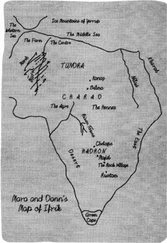This tale is set firmly in its place and time, detail by certain detail, fact by verifiable fact. The magic of Jane Austen’s skill means that it is only at the end of the story you realise its kinship with ‘girl gets her man’, and begin to suspect that it is older even than that. The Cinderella tale is in every culture in the world. At least four hundred versions are known to exist, but however much it changes according to time and culture, there is a core. A heroine superior in insight and goodness is bullied by a sometimes cruel mother who prefers stupid and frivolous sisters. It is the poor girl who in the end charms the Prince’s – or spirit’s, or noble being’s – heart, and she lives happy ever after while her ignoble relatives repine.
Here we have a superior girl, in Elizabeth Bennet, but she does have a good sister, so she is not alone. She has not two but three awful sisters who are the favourites of their mother. Her fairy godmother is her aunt, a kind and sensible woman. Elizabeth Bennet achieves her noble lover through force of her own character and against the will of the awful Lady Catherine de Bourgh, surely the wicked witch.
Pride and Prejudice is recognisably from the same level of human experience, a tale that merges back into the unconscious depths of humanity everywhere. Surely its ancient origins are why it enthrals generation after generation of readers?
D. H. Lawrence’s ‘The Fox’
Lawrence the man and D. H. Lawrence the writer: both provoked strong reactions in his lifetime, and it all still goes on. He had the defects of his qualities; he had no defects, he was a genius; he is at the heart of English literature; he is secure in his place in world literature; he was a misogynist and a scumbag. But pick up a Lawrence tale and the old magic begins working. I read him as a young woman in the old Rhodesia, and not in the proper order: in wartime one grabs what one can get. It was Aaron’s Rod , my first one: and nearly sixty years later in my mind are scenes as bright as they were then. The sounds of water as a man washes, listening while his wife bad-mouths him, for he is leaving her for ever. Nascently fascist Italy, plagued by gangs of unemployed youths; mountains streaked with snow like tigers; the vividness of it all: I was seduced while resisting the man’s message, which seemed to be a recommendation to find a strong personality to submit oneself to. And so with Kangaroo and the Australian bush which I can see now as he described it, dreamlike and spectral, different from the bush I actually saw later. Quite forgotten is the nonsense about the strong Leader and his followers, suspiciously like storm troopers. All his books have it, he spellbinds, he knocks you over the head with the power of his identification with what he sees. It is generally agreed, even by antagonists, that Sons and Lovers and The Rainbow remain unassailable, but that is about it. Then things go from bad to worse, they say, and as for the swooning Mexican rhapsodies – better forget them. No writer has been easier to parody. I myself have shrieked as loudly with laughter as anyone, even while mentally hearing Lawrence’s ‘ Canaille, canaille ’ and his intemperate ranting, for like many who have a talent for abusing others, he could not stand so much as a whisper of criticism. Amid all this noise it is often forgotten that he wrote fine poems, and that some of his short stories are as good as any in the language.
The story ‘The Fox’ is quintessential Lawrence, on the cusp, as it were, of the light and the dark. Its atmosphere is so strong one may easily forget how firmly it is set in its time and place. The war is just over, and the soldiers are coming home. It must be 1919 because the great flu epidemic has victims in the near village. We have had another postwar grimness since then: poor food, cold, bare sufficiency, endurance. This one preceded what some of us remember by 30 years. Food is short. So is fuel. The winter is coming. A little farm where two young women are trying for independence is shadowed by the war. They are failing, they don’t know how to farm. Emotionally they aren’t doing too well either: there is bleakness and fear for the future. Despondency finds an easy entry, and they have a visible enemy, a fox that steals their precious chickens. It is decided this thief must be shot, but he is too clever for them.
This animal obsesses March, the stronger of the two women. From the first, this beast is more than itself. ‘For he had lifted his eyes upon her and his knowing look entered her brain. She did not so much think of him: she was possessed by him.’ The biblical echoes here are part of the spell: the fox again and again ‘came over her like a spell’.
Strongly set as this tale is in its social place, we have left realism behind. So it always is with Lawrence’s animals. His feeling for them, or with them, is much more than anthropomorphism or the sentimentality these islands are sometimes accused of. The fox is representative of some force or power, alien, inhuman, other, part of an old world, inaccessible to humans. Except of course through intermediaries, like Lawrence, whom it is easy to see in a line of descent from the old shamans, whose knowledge of animals was a reaching out to other dimensions. This fox is demonic. ‘She felt him invisibly master her spirit.’
We are not unfamiliar with special relationships in our mundane world, human with animal – cats, dogs, horses, birds, even pigs. They are so common we scarcely think about them. But it is odd how the animal world is tamed and domesticated in our homes and often in our hearts. We may imagine that useful space alien reporting that here is a world where humans are surrounded by animals, even submerged in them, often hard to distinguish one from the other. Some scientists say man’s friendship with dogs goes back to the dawn of our history: they even suggest that those first human groups who domesticated wolves that later became dogs prospered, and dominated groups who did not, eventually conquering them. There, in the dawn of humankind, it is not only humans we see outlined against the flames of those cave fires, but the dogs. And surely, just outside the circle of firelight, the first foxes. Animals shade off into the wild and the wilderness, in tales and in legends, and the first men probably did not know where their thoughts ended and the consciousness of beasts began.
Reading Lawrence, such ideas have to present themselves. Who, what is this impudent fox?
Perhaps it is that – coming nearer by thousands of years – we modern people, who have killed the wild animals that lurked once at the edges of human life, miss them and want them back, and have replaced them with dogs and cats and innumerable tales about wild beasts. I once owned a cottage on the edge of Dartmoor, and the deed that gave me possession said I might keep four sheep on the moor in return for killing wolves and bears that threatened the safety of Queen Elizabeth. The First. Quite close, that was, only a little run of the centuries. So recently was the howling of wolves in people’s ears at night; and travellers might have to run from a bear. In Africa now, where humans have not completely triumphed, you feel the presence of animals always, watching you as you move about, aware of you, wary of you. In the English countryside, Reynard, of all the wild animals, must know every movement we make. His eyes are on us, and now in our towns as well. The busy marauders visit our gardens. The fox of this tale knows the ways of the two young women.
Wolves and bears have gone, both of them animals powerful in magic and in folklore, and once their pelts and paws dangled from the shamans’ shoulders and headgear, as did the fox’s. Lawrence was brought up in a mining town but really he was a country boy: the fields and woods were all around him, and are in what he wrote. No writer has ever identified so strongly with the wild, and with beasts. The old shamans did, the storytellers. For them and for Lawrence an animal was never what it seemed. A white peacock is the spirit of a screeching woman. Who could forget St Mawr, the horse who comes out of some primeval world? Even the pheasants’ chicks being raised in the dim and dusky wood are like emanations of the forces of fecundity. And here is the fox in this tale. Into the sylvan scene where two young women are struggling for economic survival, a young man comes, impudent, and daring, like the fox. In fact he is a soldier, from the fighting in Salonika. Soldiers come home from wars to the women who have been holding the fort. Nothing much is made of him, as a fighter, though he does remark that they had had enough of rifles. What we do feel, though, is his restlessness, his homelessness.
Читать дальше











